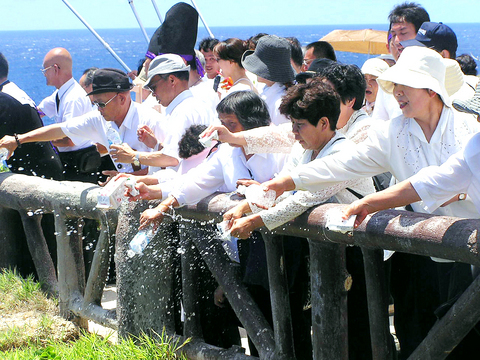In the first visit by a Japanese monarch to a World War II battlesite abroad, Emperor Akihito arrived on this tiny US territory yesterday to pray for tens of thousands of Japanese lives lost here in the name of his father, plus the thousands of US soldiers and islanders killed.
But the visit comes amid growing anger in China and the Koreas over what many there see as Japan's failure to make amends and over repeated visits by Prime Minister Junichiro Koizumi to a war shrine in Tokyo that is a powerful symbol of Japan's pre-1945 militarism.
Akihito and Empress Michiko were to spend two days on this semitropical island, where some of World War II's fiercest fighting marked the beginning of the end for Japan's war machine in the Pacific.

PHOTO: AFP
One scheduled stop was "Banzai Cliff," where Japanese fearing capture by US troops plunged to their deaths after shouting "banzai," which means long life, for Akihito's father, the late Emperor Hirohito.
"Our hearts ache when we think of those people who fought at a place where there was no food, no water, no medical treatment for the wounded," Akihito said in a statement at Tokyo's airport.
The royal couple also planned to place wreaths at monuments to the US troops and the local islanders, mostly Chamorro or Carolinians, who were killed.
At least 30,000 Japanese troops -- some Japanese estimates go as high as 43,000 -- and 12,000 civilians died in the battle. More than 5,000 Americans, about half of them Marines, and 1,000 or so islanders also were killed on Saipan or nearby islands.
Akihito, who was 11 years old when the war ended, attends an annual ceremony in Tokyo marking Japan's 1945 defeat.
He has been to China and has expressed remorse for the past during visits to Japan by South Korean leaders.
But he has never made a trip to offer condolences at a former battlefield overseas.
"This time on soil beyond our shores, we will once again mourn and pay tribute to all those who lost their lives in the war and we will remember the difficult path the bereaved families had to follow," he said in the statement. "And we wish to pray for world peace."
But anger over Japan's militarist past still runs deep in Asia, where many believe Tokyo has failed to atone.
Though Akihito was expected to receive a warm welcome here -- Saipan's economy relies heavily on Japanese tourism, and flag-waving crowds braved a downpour to line the path of his motorcade -- such sensitivities hung over the visit.
A small minority of Koreans living here threatened to stage protests because the imperial couple was not expected to pay their respects at a memorial to the Koreans who died fighting here.
Korea was a Japanese colony from 1910 until 1945, and many Koreans were forced to fight for the Japanese military.
Operation Forager, which began on June 15, 1944, has been called the D-Day of the Pacific.
The fall of Saipan three weeks later allowed US B-29 bombers to pound Japan's cities, weakening the country's defenses and will to fight.

MONEY GRAB: People were rushing to collect bills scattered on the ground after the plane transporting money crashed, which an official said hindered rescue efforts A cargo plane carrying money on Friday crashed near Bolivia’s capital, damaging about a dozen vehicles on highway, scattering bills on the ground and leaving at least 15 people dead and others injured, an official said. Bolivian Minister of Defense Marcelo Salinas said the Hercules C-130 plane was transporting newly printed Bolivian currency when it “landed and veered off the runway” at an airport in El Alto, a city adjacent to La Paz, before ending up in a nearby field. Firefighters managed to put out the flames that engulfed the aircraft. Fire chief Pavel Tovar said at least 15 people died, but

LIKE FATHER, LIKE DAUGHTER: By showing Ju-ae’s ability to handle a weapon, the photos ‘suggest she is indeed receiving training as a successor,’ an academic said North Korea on Saturday released a rare image of leader Kim Jong-un’s teenage daughter firing a rifle at a shooting range, adding to speculation that she is being groomed as his successor. Kim’s daughter, Ju-ae, has long been seen as the next in line to rule the secretive, nuclear-armed state, and took part in a string of recent high-profile outings, including last week’s military parade marking the closing stages of North Korea’s key party congress. Pyongyang’s official Korean Central News Agency (KCNA) released a photo of Ju-ae shooting a rifle at an outdoor shooting range, peering through a rifle scope

South Korea would soon no longer be one of the few countries where Google Maps does not work properly, after its security-conscious government reversed a two-decade stance to approve the export of high-precision map data to overseas servers. The approval was made “on the condition that strict security requirements are met,” the South Korean Ministry of Land, Infrastructure and Transport said. Those conditions include blurring military and other sensitive security-related facilities, as well as restricting longitude and latitude coordinates for South Korean territory on products such as Google Maps and Google Earth, it said. The decision is expected to hurt Naver and Kakao

India and Canada yesterday reached a string of agreements, including on critical mineral cooperation and a “landmark” uranium supply deal for nuclear power, the countries’ leaders said in New Delhi. The pacts, which also covered technology and promoting the use of renewable energy, were announced after Indian Prime Minister Narendra Modi and Canadian Prime Minister Mark Carney hailed a fresh start in the relationship between their nations. “Our ties have seen a new energy, mutual trust and positivity,” Modi said. Carney’s visit is a key step forward in ties that effectively collapsed in 2023 after Ottawa accused New Delhi